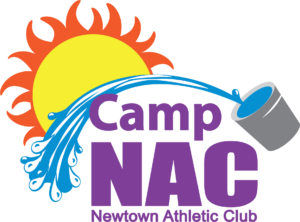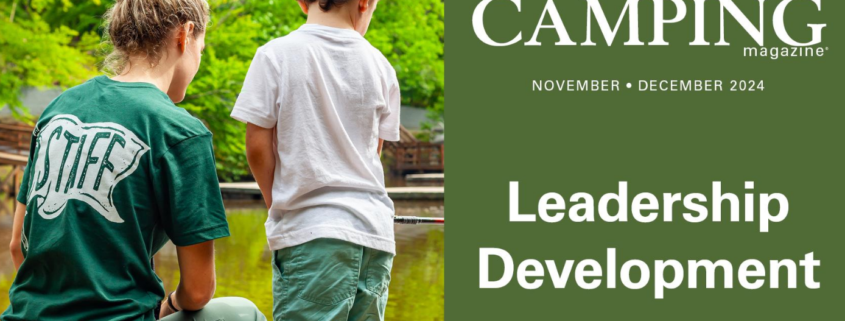Seven Steps to Cultivating a Culture of Appreciation
Congratulations to our Camp NAC Director, Brianne Feinour, on having her article published in the November/December edition of the American Camp Association’s Camping Magazine! Check out the full article below.
________________________
“True leadership is not about being in charge. It’s about taking care of those in your charge.”
— Simon Sinek
Imagine walking into a camp where every staff member and camper feels genuinely valued and inspired to contribute their best. This is the environment we’ve cultivated at Camp NAC by integrating appreciation into every facet of our camp culture. This approach has proven to be transformative, enhancing both staff morale and camper experiences. Here’s how we’ve achieved this and how you can implement similar strategies in your own camp community.
Last summer, we saw a remarkable shift in our community dynamics following the introduction of our new appreciation initiatives. One notable example involved our “Appreciation Moments,” a daily practice during which staff and campers exchange positive feedback. This simple yet powerful exercise led to a noticeable increase in engagement, satisfaction, and overall camp spirit (Chapman, 2004).
Additionally, our weekly “Super Staff” highlights on social media have created a buzz, celebrating outstanding contributions and spreading positivity throughout our community. For instance, one staff member who was featured shared, “Being recognized as ‘Super Staff’ not only made me feel appreciated but also motivated me to strive for excellence. It’s amazing how a small gesture can have such a significant impact.”
These initiatives underscore the importance of embedding appreciation into everyday practices to foster a supportive and growth-oriented environment. Here are some concrete steps to cultivate appreciation:
- Words of affirmation. Introduce “bucket-filler slips” on which staff and campers can write and exchange positive messages. This practice helps to create a culture of encouragement and recognize individual contributions (McCloud, 2015). For example, a staff member might receive a slip that says, “Your enthusiasm during activities really brightens up the camp. Thank you for making every day special!”
- Quality time. Schedule regular professional development sessions and staff bonding activities. These opportunities allow staff to connect on a personal level, collaborate on new ideas, and strengthen their teamwork. Activities might include workshops on leadership skills, team-building exercises, and informal social events (Chapman, 2004).
- Physical touch. Incorporate simple physical gestures such as high-fives into your daily routines. This small act of physical touch can convey encouragement and support, fostering a sense of camaraderie. During morning meetings or after a successful activity, high-fives can serve as a quick yet meaningful acknowledgment of everyone’s efforts (Chapman, 2004).
- Acts of service. Implement a system through which support counselors actively assist their colleagues and campers. This could involve helping with challenging tasks, offering guidance, or providing emotional support. For instance, if a camper is struggling with an activity, a support counselor could step in to offer assistance and encouragement (McCloud, 2015).
- Receiving gifts. Distribute tokens of appreciation and small gifts, such as “You’re the Balm” lip balm and snacks. These tangible items serve as reminders of recognition and gratitude. For example, a staff member might receive a lip balm with a note that says, “Your hard work doesn’t go unnoticed. Enjoy this small token of our appreciation” (Chapman, 2004).
- Random acts of kindness. Organize surprise acts of kindness, such as popsicle carts and coffee shop days. These spontaneous gestures create moments of joy and appreciation, enhancing the overall camp experience. Imagine a surprise popsicle cart arriving on a hot day — such unexpected treats can lift spirits and foster a sense of community (McCloud, 2015).
- Social media recognition. Share weekly “Super Staff” features on social media to publicly celebrate exceptional contributions. Highlighting staff achievements on platforms such as Instagram or Facebook not only acknowledges their efforts but also fosters a sense of pride and engagement within the broader community (McCloud, 2015).
Helpful Suggestions for Camp Professionals
As a leader, keep the following suggestions in mind when implementing appreciation practices:
- Lead by example. Your involvement in and endorsement of appreciation practices can set a positive tone for the entire camp. Show your commitment by actively participating in recognition activities and sharing your own experiences of growth and appreciation.
- Seek regular feedback. Ask for frequent feedback from staff and campers about the effectiveness of your appreciation strategies. This feedback can help you make necessary adjustments and ensure that your practices are meeting your community’s needs.
- Celebrate diversity. Recognize and celebrate the diverse ways people experience appreciation. Tailor your strategies to accommodate different preferences and ensure that all individuals feel valued and included.
Creating a culture of appreciation is crucial in a camp setting. Positive reinforcement and recognition can significantly influence staff performance and camper engagement. Studies show that a supportive environment where individuals feel valued enhances motivation, fosters personal and professional growth, and strengthens community bonds (Mind Matters from Menninger, 2021).
Additional Resources
Books:
- The Five Love Languages: How to Express Heartfelt Commitment to Your Mate, by Gary Chapman
- Have You Filled a Bucket Today? A Guide to Daily Happiness for Kids, by Carol McCloud
Websites:
- American Camp Association — ACAcamps.org
- Psychology Today — The Many Benefits of Showing Appreciation: psychologytoday.com/us/blog/what-matters-most/201409/the-many-benefits-of-showing-appreciation
Organizations:
- Camp Leadership Institute — Provides resources and training for camp professionals on fostering positive camp cultures
- National Association for the Education of Young Children (NAEYC) — Offers guidelines and resources for supporting youth development and appreciation
Camp NAC is an independent camp for youth, families, and community members in Newtown, Pennsylvania. It offers a variety of programming, including overnight camps, day camps, after-school programs, and family events.
References
- Chapman, G. (2004). The five love languages: How to express heartfelt commitment to your mate. Chicago, IL: Northfield Publishing.
- McCloud, C. (2015). Have you filled a bucket today? A guide to daily happiness for kids. Brighton, MI: Bucket Fillers, Inc.
- Mind Matters from Menninger. (2021, November 23). Strength in numbers: Developing resilient communities. Psychology Today. psychologytoday.com/us/blog/mind-matters-menninger/202111/strength-in-numbers-developing-resilient-communities
- NieMiec, R. M. (2014, September 10). The many benefits of showing appreciation. Psychology Today. psychologytoday.com/us/blog/what-matters-most/201409/the-many-benefits-of-showing-appreciation
Brianne Feinour is the camp director at Camp NAC, specializing in fostering a culture of appreciation and growth. With extensive experience in camp leadership and staff development, Brianne is dedicated to enhancing camp environments through positive reinforcement.



Leave a Reply
Want to join the discussion?Feel free to contribute!